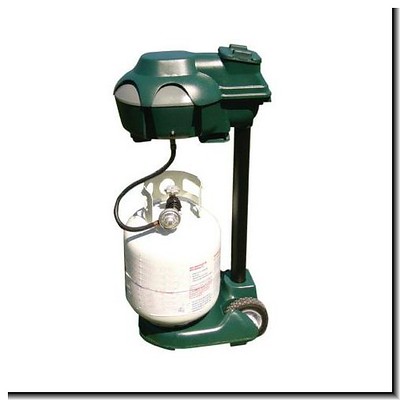
Are you tired of the incessant buzz of mosquitoes and the itch of their bites? Are you on the verge of declaring war on these tiny, blood-sucking creatures?
If you’ve been scouring the market for an effective mosquito control solution, you’ve probably stumbled upon propane mosquito traps.
These intriguing contraptions, designed to mimic the enticing scents of humans, promise to lure, trap, and drastically reduce mosquito populations. But do they live up to the hype? Are propane mosquito traps really the mosquito-slaying heroes they claim to be, or are they just another gimmick in the endless lineup of pest control products?
Let’s dive deep into the world of propane mosquito traps to uncover the truth. Prepare yourself for an exciting, buzz-free journey into the science, effectiveness, and pros and cons of these innovative devices.
Is it the silver bullet we’ve all been waiting for? Are they really as effective as the manufacturers claim? Let’s find out!
Read this: What are Some Disadvantages of Propane? (Exploring the Drawbacks)
Demystifying the Concept Behind Propane Mosquito Traps
Alright, let’s start with the basics. These traps are devices designed to mimic humans (or other large animals). How so, you ask? Well, these insects are drawn to us primarily because of the carbon dioxide (CO2) we exhale. By burning propane, these traps emit CO2, tricking mosquitoes into thinking there’s a tasty meal waiting.
But it’s not just about the CO2. The traps also release moisture and heat, replicating human perspiration and body temperature. And to sweeten the deal, some even emit a synthetic version of lactic acid, a compound naturally present in human skin. The result? An irresistible all-you-can-eat buffet for these insects.
Read this: Why Does Propane Smell When the Tank is Low?
Measuring the Effectiveness of Propane Mosquito Traps
The big question, of course, is do these traps really work? The answer isn’t as straightforward as you might think. Several scientific studies have confirmed that traps can indeed reduce populations, but there’s a significant ‘but’ involved here. The effectiveness of these traps can depend on a variety of factors.
For instance, the specific species of mosquito, the size of the area, and the proximity to breeding sites can all play a role in how well a trap performs. In comparison to other control methods, propane traps have a distinct advantage in that they actively lure and trap these insects, reducing the overall population, rather than just repelling them to another area.
The Advantages of Propane Mosquito Traps
Now, let’s talk perks. One of the biggest benefits of mosquito traps is their environmentally friendly approach. Unlike foggers or sprays, propane traps don’t involve any harmful chemicals. This means they won’t harm beneficial insects or contribute to environmental pollution.
Another major plus is that they provide a continuous solution. While bug zappers and repellents offer temporary relief, propane traps work round the clock to reduce populations of these insects. And they cover a large area, making them ideal for those with big yards or gardens.
The Disadvantages of Propane Mosquito Traps
Nothing’s perfect, and propane mosquito traps are no exception. First off, they can be quite pricey, both in terms of the initial investment and the ongoing need for propane refills and maintenance. Secondly, they’re not an instant solution. It can take several weeks of continuous use before a significant reduction in populations is noticeable.
Another consideration is that while these traps are effective against many species of these insects, they might not be as effective against all. Some species might be less attracted to the CO2 and heat emitted by the traps, meaning you may still have a few unwanted guests at your next barbecue.
Maximizing the Effectiveness of Propane Traps
If you’re considering a propane mosquito trap, there are ways to get the most bang for your buck. Correct placement is key. Ideally, the trap should be placed between the breeding area (like a pond or marsh) and the area you want to protect.
Regular maintenance is also important. This includes cleaning the trap, replacing the propane tank as needed, and changing the attractant if your trap uses one.
Furthermore, while traps are a powerful tool, they shouldn’t be your only line of defense. Combining them with other insect control methods, like eliminating standing water or using repellents, can lead to more comprehensive protection. Think of it as building an all-encompassing fortress against these pesky invaders.
The Pros and Cons
Ah, the grand debate of pros and cons. When it comes to devices designed to tackle our little winged adversaries, there’s definitely a list of pluses and minuses to consider. Let’s delve into the advantages and potential downsides, shall we?
| Pros | Cons | |
|---|---|---|
| Eco-Friendly | Devices are environmentally friendly, not relying on harmful chemicals or pesticides. | None |
| Effectiveness | Devices provide a continuous solution, working 24/7 to reduce mosquito populations. | It can take several weeks to see a significant reduction in mosquito populations. |
| Coverage | Depending on the model, devices can cover a large area, making them suitable for spacious yards or gardens. | None |
| Costs | None | The initial investment can be significant, and there are ongoing operational and maintenance costs. |
| Species Specificity | Devices can effectively lure and trap many mosquito species. | Some mosquito species may be less attracted to the lures these devices use. |
Like any solution, these devices have their pros and cons. The key is understanding your specific needs and circumstances, and making an informed choice. With the right device, a bit of patience, and a multi-pronged approach to mosquito control, you can reclaim your outdoor spaces and enjoy those summer nights as they were meant to be – mosquito-free!
How to Choose the Best Propane Mosquito Trap
Ah, the quest for the best propane mosquito trap. It’s like looking for the Holy Grail in the world of pest control. However, with a bit of guidance and key considerations, you can find the one that suits your needs perfectly.
Understand the Mechanism
To choose the best propane mosquito trap, you first need to understand the mechanism. As we’ve previously covered, these traps use propane to produce carbon dioxide, which lures these insects. However, different models might incorporate additional features to enhance their attractiveness. These could include heat, moisture, octenol attractants, or even UV light. A trap with multiple attractants can often be more effective at luring a variety of species.
Consider the Coverage Area
The coverage area is another crucial factor. If you’re dealing with a large yard, you’ll need a trap designed to cover a wider radius. On the other hand, for smaller spaces, a trap with a smaller coverage area should suffice. Be sure to check the product specifications to find the one best suited to your outdoor space.
Evaluate the Cost and Maintenance
A propane mosquito trap is an investment, and like any investment, you need to consider the cost. This doesn’t just mean the upfront cost of the trap itself, but also the ongoing costs of propane refills and maintenance. Some traps might be less expensive initially but could end up costing more in the long run due to high maintenance needs.
Look at User Reviews and Ratings
Nothing beats real-world experience. Look at user reviews and ratings to get an idea of how well the trap performs in actual conditions. This can give you valuable insights into its effectiveness, ease of use, and durability.
Assess the Brand’s Reputation
Lastly, consider the reputation of the brand. Companies with a history of producing high-quality, reliable products are usually a safer bet. They’re also more likely to offer good customer service and honor warranties, which can be a lifesaver if you encounter any issues with the trap.
In conclusion, choosing the best propane mosquito trap is all about understanding your specific needs and doing a bit of homework. By considering the above factors, you can find a trap that’s not just effective at reducing their populations, but also offers good value for money and is easy to maintain.
Conclusion
So, there we have it, folks. The long and short of propane mosquito traps. Yes, they can effectively reduce populations, but they’re not a magical, instantaneous solution. They’re a bit like a fine wine, requiring time to yield the best results. And let’s not forget, they do come with some baggage, namely the initial costs and the need for ongoing maintenance.
However, if you’re waging war on a mosquito army, they’re a formidable weapon to have in your arsenal. Their eco-friendly nature, continuous action, and extensive coverage make them a worthy investment for those seeking long-term solutions. And let’s face it, being able to enjoy a summer evening without being eaten alive? Priceless.
But remember, to truly reclaim your backyard, it’s crucial to combine the traps with other control methods. In this multi-fronted battle, the more tools you have, the better your chances of victory. After all, everyone deserves to enjoy their outdoor spaces without becoming a meal.
So, if you’re tired of being a midnight snack for these insects and are ready to fight back, a mosquito trap might be just the ticket. Consider the pros and cons, assess your specific situation, and make an informed decision. May your summer evenings be filled with laughter and joy, and absolutely devoid of bites!
Remember, the key here is patience. Rome wasn’t built in a day, and your backyard won’t become a mosquito-free zone overnight. But with the right tools, strategies, and a bit of perseverance, you can reclaim your space and enjoy those summer nights as they were meant to be enjoyed – mosquito-free.
With that, we wrap up our exploration into the world of propane mosquito traps. We hope this guide has been helpful in shining a light on these modern pest control wonders. Here’s to making your outdoor adventures less about swatting mosquitoes and more about creating beautiful memories! Cheers!

Jeremy is a highly experienced professional propane technician with over 21 years of experience in the industry. Throughout his career, he has gained extensive knowledge and expertise in propane gas installation, maintenance, and repair, as well as in ensuring safety and compliance with industry standards. Mike has worked with various residential, commercial, and industrial clients, providing top-notch services and solutions to meet their propane needs. He is dedicated to his craft and passionate about delivering exceptional service to his clients.



